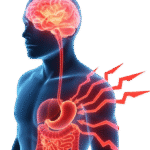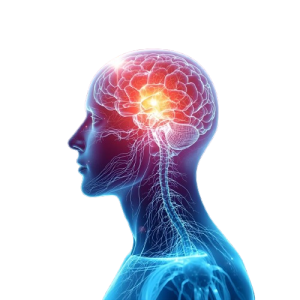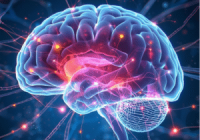Have you ever noticed that when you’re nervous, your stomach tightens up? Or that when you’re upset, you lose your appetite? These feelings are not random — they’re signals from your gut health. What happens in your digestive system deeply affects how you feel, think, and behave. This powerful gut-brain connection is now recognized as one of the most important keys to mental health, emotional balance, and overall wellness.

Understanding the Gut-Brain Connection
The gut-brain connection is a two-way system between your digestive system and your brain. It’s controlled by the vagus nerve, which sends signals both ways. Your gut also has over 100 million nerve cells — often called the “second brain.”
Inside your intestines lives the gut microbiome, a community of trillions of bacteria. These microbes break down food, absorb nutrients, and even produce brain-boosting chemicals. When your gut bacteria are balanced, they support good digestion, stable mood, strong immunity, and better energy. But when harmful bacteria overgrow (a condition called dysbiosis), it can trigger inflammation, poor digestion, and mental health struggles.
How Gut Health Affects Your Mood and Mind
We often think of the brain as the command center of the body, but science shows that the gut microbiome plays an equally critical role. The gut and brain are linked through the gut-brain axis, a complex communication system that influences your mood, energy, digestion, and even immunity. When your gut is healthy, this connection works in harmony. But when it’s unbalanced, it can lead to anxiety, depression, fatigue, digestive problems, and mood swings.
The truth is, healing your gut could be the missing step toward achieving real mental, physical, and emotional wellness.
– Around 90% of serotonin (the happiness hormone) is made in your gut.
– Healthy probiotics in your digestive system regulate serotonin, dopamine, and GABA—chemicals linked to mood, sleep, and relaxation.
– Poor gut health or leaky gut syndrome disrupts these signals, causing anxiety, depression, stress, brain fog, and fatigue.
Stress also impacts the gut. When cortisol (the stress hormone) rises, it weakens digestion, damages the gut lining, and reduces good bacteria. This creates a cycle: stress harms your gut, and your unhealthy gut worsens stress and mood problems.
Chronic gut inflammation also contributes to brain fog, mood swings, poor sleep, and even long-term mental health conditions.

Signs of Poor Gut Health

– Bloating, gas, acidity, or constipation
– Food intolerances and sugar cravings
– Frequent fatigue and low energy
– Skin problems (acne, dullness, rashes)
– Anxiety, irritability, or poor focus
If you recognize these signs, it’s time to focus on gut healing foods, probiotics, and lifestyle changes.
How to Heal Your Gut Naturally
Healing your gut doesn’t require expensive supplements — just consistent healthy habits:
1. Eat a gut-friendly diet
– Include fiber-rich foods: vegetables, lentils, fruits, seeds.
– Add prebiotics (onions, garlic, bananas) and probiotics (curd, yogurt, kefir, kimchi , homemade pickles).
– Reduce processed food, sugar, fried snacks, and artificial sweeteners.
2. Stay hydrated
– Water keeps the gut lining strong and helps digestion.
3. Manage stress
– Meditation, yoga, journaling, and deep breathing reduce cortisol and protect gut balance.
4. Get enough sleep
– 7–8 hours of quality rest helps your gut microbiome reset and repair.
5. Move daily
– Walking, stretching, or light workouts improve digestion and support the gut-brain axis.


Indian Superfoods for Gut Healing
– Curd (dahi) → rich in probiotics
– Amla (Indian gooseberry) → boosts immunity, reduces acidity
– Turmeric (haldi) → fights gut inflammation
– Jeera water → aids digestion, reduces bloating
– Makhana (fox nuts) → high in fiber and antioxidants
Adding these Indian superfoods to your daily meals can naturally heal your gut and improve digestion.
What Happens When You Heal Your Gut ?

When you improve gut health naturally, results show quickly:
– Smooth digestion, less bloating, stronger immunity
– Higher energy levels and better focus
– Stable mood, reduced anxiety, and improved sleep
– Clearer skin and fewer sugar cravings
The best part? Once balanced, your gut microbiome keeps supporting your mental and physical health long-term.
Make Gut Health a Lifestyle
– Start mornings with warm water or cumin water.
– Eat slowly and chew well for better digestion.
– Include one probiotic food daily.
– Reduce screen time to calm your mind.
– Sleep on time to keep your gut-brain axis healthy.
These simple habits create lifelong benefits for both gut health and mental wellness.
The Science is Clear
Studies confirm that gut health directly impacts mental health. Diets rich in whole foods, probiotics, and fiber lower anxiety and depression. The Mediterranean diet (vegetables, fruits, legumes, healthy fats) is one of the best models for both digestive and emotional health.

Final Thoughts
Your gut is your second brain. It silently controls your digestion, emotions, energy, and even your immunity. By eating gut-healing foods, managing stress, and living mindfully, you can truly heal your gut and heal your mind.
True health doesn’t begin in the gym — it begins in the gut microbiome, the place where your physical and emotional worlds meet.


We often think of the brain as the command center of the body, but science shows that the gut microbiome plays an equally critical role. The gut and brain are linked through the gut-brain axis, a complex communication system that influences your mood, energy, digestion, and even immunity. When your gut is healthy, this connection works in harmony. But when it’s unbalanced, it can lead to anxiety, depression, fatigue, digestive problems, and mood swings.
The truth is, healing your gut could be the missing step toward achieving real mental, physical, and emotional wellness.
